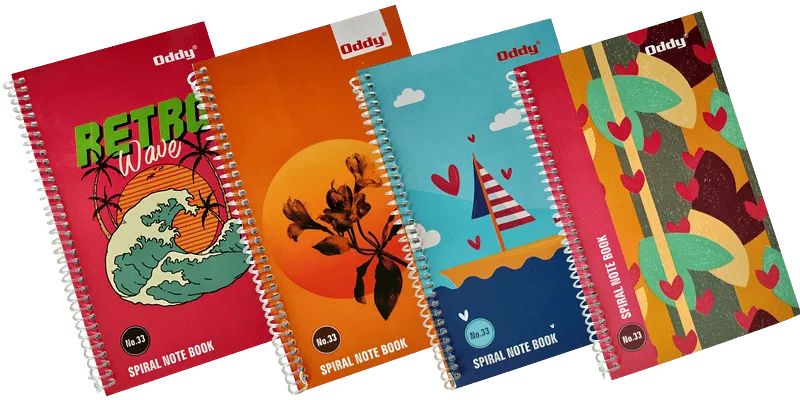Here's how stationery brand Oddy is clocking Rs 100 Cr annual turnover in a paperless time
Delhi-based stationery company Oddy manufactures 97 products, including notebooks, sticky notes, glue sticks and more. It competes with the likes of Camlin, Faber Castell, and Kores, and is targeting an annual turnover of Rs 600 crore in the next five years.
After completing his graduation from Delhi University, Delhi-based Atul Garg joined his father’s wholesale stationery business and started selling products from other brands. He realised that customers trusted brands so much that they were sometimes willing to pay extra just for the brand value.
Eventually, Atul decided to start his own stationery business. He launched in 1998. His father, Niwas Garg, suggested the name On Demand, which led to the brand being named Oddy.
Today, the Delhi-based company competes with the likes of Camlin, Faber Castell, Kores, and more in the Indian market. Oddy manufactures 97 products under its brand, including writing pads, notebooks, sticky notes, glue sticks and much more. It has 500 stock keeping units (SKUs) and over 25,000 retail touchpoints.
For the past two years, the stationery manufacturer has been clocking a turnover of Rs 100 crore annually.
Humble beginnings
Oddy was started from the basement of Atul’s home, with financial help from his father and other suppliers. Atul initially wanted to launch a manufacturing unit, but outsourced the services to a third party.
The company started operations at a time when digital marketing did not exist. So, Atul started thinking of unique ways to create customer awareness for the brand.
He started by printing the brand name on cartons to increase brand visibility. At times, he even sent 'fake customers' to shops to ask for the Oddy brand, so that retailers ordered more stock.
These efforts paid off in 2000 when the company set up its first manufacturing unit in Haryana. In 2003, the factory became a full-fledged unit. At present, the company has three manufacturing units across Haryana and Okhla.

Oddy factory
Raw materials determine the output
The fundamental rule that exists in all product marketing is — “whoever buys it, recommends it,” and Atul stands by it.
He says, “Two factors determine the quality of the product — using appropriate raw materials and quality checks at each level.”
The company procures raw material from across India and international markets. Before mass-producing any product, Oddy does a product sample check and collects feedback from users.
Adjusting to the paperless era
Before 2005, Atul says the prospects for the stationery industry were very bright. But, as environmental concerns grew, Oddy started reporting negative growth.
With more people moving away from paper and pen to laptops and other tech devices, the demand for stationery items further fell. “We had invested in machinery and factory, but with all this came the realisation that this business might not grow very much,” Atul shares.
The company eventually found a way around this situation. It noticed that the demand for white paper for printing in offices had significantly increased, and it capitalised on it to produce white sheets and coloured papers.
In 2017, Atul launched a separate company called Uniwrap to manufacture food wrapping paper. After realising that the commonly used aluminum foil used for wrapping food could be harmful, he decided to manufacture a paper that was non-sticky, water-resistant, biodegradable, and healthy.

Notebooks by Oddy
In the time of COVID-19
Between 2007 and 2008, Oddy partnered with Walmart-owned to sell its products online.
Venturing into the ecommerce space helped Oddy, especially during the coronavirus-led lockdown. About 10 percent of sales for Oddy and 60 percent for Uniwrap came from online platforms.
The company used the lockdown to install an injection moulding machine in its factory. The machine has helped Oddy manufacture sturdy, better-finished products at a competitive price.
An export-led perspective
Data pegs the Indian stationery market at around Rs 4,000 crore. While the sector is growing, Atul says it still lacks proper logistics infrastructure.
India competes with China when it comes to the export of stationery products. But Atul is not fazed by that; he says the real competition is from Europe, the US, and Japan, which export quality products.
For the Indian market, he says, creating useful products at the right price point is the way to success. “Just for the sake of writing and not asserting any status symbol, a Rs 5 pen is good enough, but when the status symbol comes in, there is no limit on the pricing,” Atul claims.
Having an export-led perspective is important if the stationery industry wants to grow, Atul says. He adds that despite a slump in demand if India — like China — starts producing for the global audience, there will be no dearth in the demand for stationery.
Presently catering only to the Indian market, the company is looking at going global in the coming years.
Oddy is targeting a turnover of Rs 600 crore in the next five years. It also plans to make products that are hobby and household-oriented in the coming days.
The company is in talks to set up joint ventures with European and American companies looking to launch manufacturing facilities in India. Atul says this will also help him "make his way into the global export market".
Edited by Suman Singh







